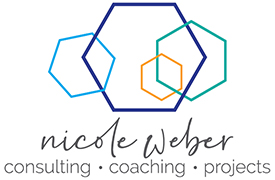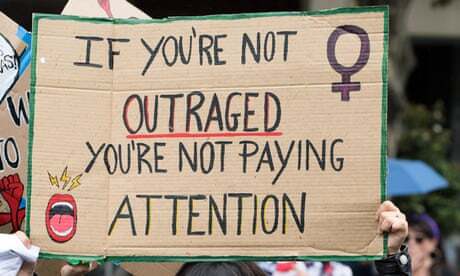(Photo credit: The Guardian)
I watched the 7:30 report last night on ABC which was solely dedicated to covering the rallies across the country asking for human rights for women. Enough is enough, they said. Enough sexual violence in workplaces, in institutions, in the community, in homes. While I watched, I shook with rage and helplessness. As a survivor of childhood sexual abuse I carry the scars of trauma. That trauma shaped my adult relationships for decades. It meant I didn’t have the boundaries or confidence to form healthy relationships. As an adult I’ve experienced domestic violence, including a relationship that nearly ended my life. In workplaces I’ve experienced sexual harassment and intimidation. I know firsthand, from decades of experience what power imbalance looks like.
I am an educated, articulate woman. I know my own mind. I have always had goals, dreams and aspirations and the will and drive to achieve them. I have always had a job. I came from a home where I had two loving parents. None of these things prevented the abuse I experienced. The violence, the trauma. Only years of therapy (and a hell of a lot of hard work) helped me redefine my sense of self, not as a victim but as a survivor.
I feel that my experiences give me the right to have a voice on this issue. I don’t have an answer, but I’ve got some ideas. 2021 Australian of the year Grace Tame is right. Silence is not the answer. Victims are told to keep secrets – it’s a hallmark of abuse. Make the victim feel shame to keep them quiet. Tell them that no-one will believe them. Every time a victim comes forward and someone asks, ‘why did it take them so long to tell their story’, or ‘how can we be sure they’re telling the truth’ they are perpetuating that abuse. My first suggestion is that we check our own thinking. We have been socialised to question victims, rather than alleged perpetrators. We jump to ‘what did they do/why didn’t they leave/how much did they have to drink’… and the list goes on. Enough of those questions.
My second idea is to get men on board, not to demonise them. There are so many good men all around us. We need to give them the tools to hold each other accountable. And we need to walk alongside the perpetrators, hold them accountable and give them the strategies to change. We need to stop the jokes and the banter that are the thin edge of the wedge, the murky puddles of toxic masculinity. When men (and women) laugh off the jokes where women are the lesser citizens, or walk past (and therefore accept) discrimination, harassment or abuse we track the mud from those murky puddles into the everyday carpet of our society. Enough toxic masculinity.
My third idea is a big one and I believe it could create inter-generational change. I think we should teach children about healthy relationships from preschool until they finish high school. Programs like Love Bites are amazing and could be an excellent (age appropriate) resource for kids of all ages. We need more resources in schools and to share these with parents. How can we expect children to recognise an abuser and have the tools to tell someone unless we talk openly about safety in relationships, of all kinds? Enough ignorance and avoidance. Let’s equip kids with the tools to know what healthy relationship look like, across all areas of life, and have the confidence to accept nothing less.
Workplaces have a big role to play. It takes more than a morning tea on White Ribbon day. It takes a culture of respect for both women and men. Special leave for domestic and family violence are a good start. A further step is creating an awareness of what discrimination, abuse, and victimisation in all its forms looks and sounds like and creating a culture of zero tolerance for these. Workplaces can offer access to information and support for victims and provide avenues for perpetrators to seek behaviour-change programs. Let’s talk about healthy relationships in workplaces; people spend a lot of time there.
As a child I wasn’t believed. I was discouraged from telling my story because of the shame and discomfort it would bring to others in my life. As an adult experiencing domestic violence, I had to ask police again and again for support. When I calmly explained to police that the perpetrator was breaking the law, they suggested I take my own action to stop him. At times I had to cry and tell my story over and over before they would act. These experiences re-traumatised me. Our systems do not support survivors. Many family systems, community systems, institutions make it almost impossible and most certainly traumatic for victims to disclose abuse. We are seeing it now play out in parliament. For me this scenario is simply a microcosm of what happens every single day in families, communities, and institutions. Enough of the social and systemic barriers.
I shake with rage and helplessness because abuse of all kinds, mostly against women, is so commonplace. People who are already marginalised such as indigenous people, people with a disability, people living in poverty, members of the LGBTQI community experience violence and abuse at a higher rate. It’s not an easy thing to tackle.
I am however, sharing my story as my own small contribution to breaking down the silence and shame that surrounds abuse. I do this in the hope that it lessens the sense of shame for even one other survivor – woman or man. To all the survivors out there, I hear you, I stand with you, I believe you.
The change we need is immense. We have to start somewhere and a good time to start would be right now. There’s enough evidence, now we need enough courage.
Enough is enough.


Recent Comments